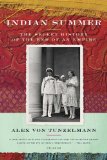Summary | Excerpt | Reviews | Beyond the Book | Readalikes | Genres & Themes | Author Bio

Critics' Opinion:
Readers' Opinion:
First Published:
Aug 2007, 416 pages
Paperback:
Sep 2008, 448 pages
 Book Reviewed by:
Book Reviewed by:
BookBrowse Review Team
Buy This Book
It was the culmination of a lifetime’s struggle; and yet, as Nehru later confided to his sister, his mind had not been on the splendid words. A few hours before, he had received a telephone call from Lahore in what was about to become West Pakistan. It was his mother’s hometown and a place where he had spent much of his childhood.4 Now it was being torn apart. Gangs of Muslims and Sikhs had clashed in the streets. The main gurdwara—the Sikh temple—was ablaze. One hundred thousand people were trapped inside the city walls without water or medical assistance. Violence was a much-predicted consequence of the handover, but preparations for dealing with it had been catastrophically inadequate. The only help available in Lahore was from two hundred Gurkhas, stationed nearby, under the command of an inexperienced British captain who was only twenty years old. They had little chance of stopping the carnage. The horror of that night in Lahore set the tone for weeks of bloodshed and destruction. Perhaps the Hindu astrologers had been right when they had declared 14 August to be an inauspicious date. Or perhaps the viceroy’s curious decision to rush independence through ten months ahead of the British government’s schedule was to blame.
Emerging into the streets of Delhi, Nehru was greeted by the ringing of temple bells, the bangs and squeals of fireworks and the happy shouting of crowds. Guns were fired, in celebration rather than in anger; an effigy of British imperialism was burned, in both.5 Soon afterward, Nehru arrived at the Viceroy’s House, a gated citadel at the end of Kingsway, New Delhi’s two-mile processional avenue. He and Rajendra Prasad, the leader of the Constituent Assembly, were to see the last of the viceroys, Earl Mountbatten of Burma.6
At forty-seven, Mountbatten was young for a viceroy but no less assured for it. Tall, broad-shouldered and handsome, he had a brilliant Hollywood smile, easy wit and immediate charm; it might never have been guessed that he had been born a prince were it not for his ability to switch to a regal demeanor. The new earl and his countess, Edwina, had kept an appropriate distance from the festivities. While freedom was declared, the couple had spent the night at home, pottering around their palace and helping the servants tidy away anything marked with an imperial emblem. They had taken a brief break to watch the latest Bob Hope movie, My Favorite Brunette. It was a pastiche of the fashionable noir genre: the story of a wayward but irresistible baroness, played by the sultry Dorothy Lamour, whose feminine wiles drag a number of men into a dangerous conspiracy. No more than a handful of those in the Viceroy’s House that evening could have realized what a very apposite choice of film it was.
While Nehru had been declaring his nation’s independence and worrying about the emerging crisis in Lahore, Mountbatten had been sitting in his study alone, thinking to himself, as he later recollected, “For still a few minutes I am the most powerful man on earth.”7 At 11:58 p.m., he settled on a last act of showmanship, creating the Australian wife of the Nawab of Palanpur a highness, in defiance of Indian caste customs and British policy. It was an act epitomizing Mountbatten’s character. Kingmaking was his favorite sport. Two minutes later, and the power had vanished.
Nehru and Prasad were greeted by the viceroy’s wife, Edwina Mountbatten, in lively form despite the lateness of the hour. Vivacious, chic and slim, at forty-five Edwina was still in her prime. Her position as one of the world’s richest women had never made her happy. But, over the course of the previous few years, she had finally found a role for herself, leading health and welfare campaigns for the Red Cross and St. John Ambulance Brigade. The heiress to millions had never been happier than when she was working in the hot, rough and filthy refugee camps that had been set up across the riot-scarred Punjab. In India, Edwina had blossomed, both in the revelation of her own work and in her close friendships with the Indian leaders, particularly Gandhi and Nehru. It was the second of these friendships that was already the subject of gossip in Delhi society.
Copyright © 2007 by Alex von Tunzelmann. All rights reserved.





The House on Biscayne Bay
by Chanel Cleeton
As death stalks a gothic mansion in Miami, the lives of two women intertwine as the past and present collide.

The Flower Sisters
by Michelle Collins Anderson
From the new Fannie Flagg of the Ozarks, a richly-woven story of family, forgiveness, and reinvention.

The Funeral Cryer by Wenyan Lu
Debut novelist Wenyan Lu brings us this witty yet profound story about one woman's midlife reawakening in contemporary rural China.
Your guide toexceptional books
BookBrowse seeks out and recommends the best in contemporary fiction and nonfiction—books that not only engage and entertain but also deepen our understanding of ourselves and the world around us.